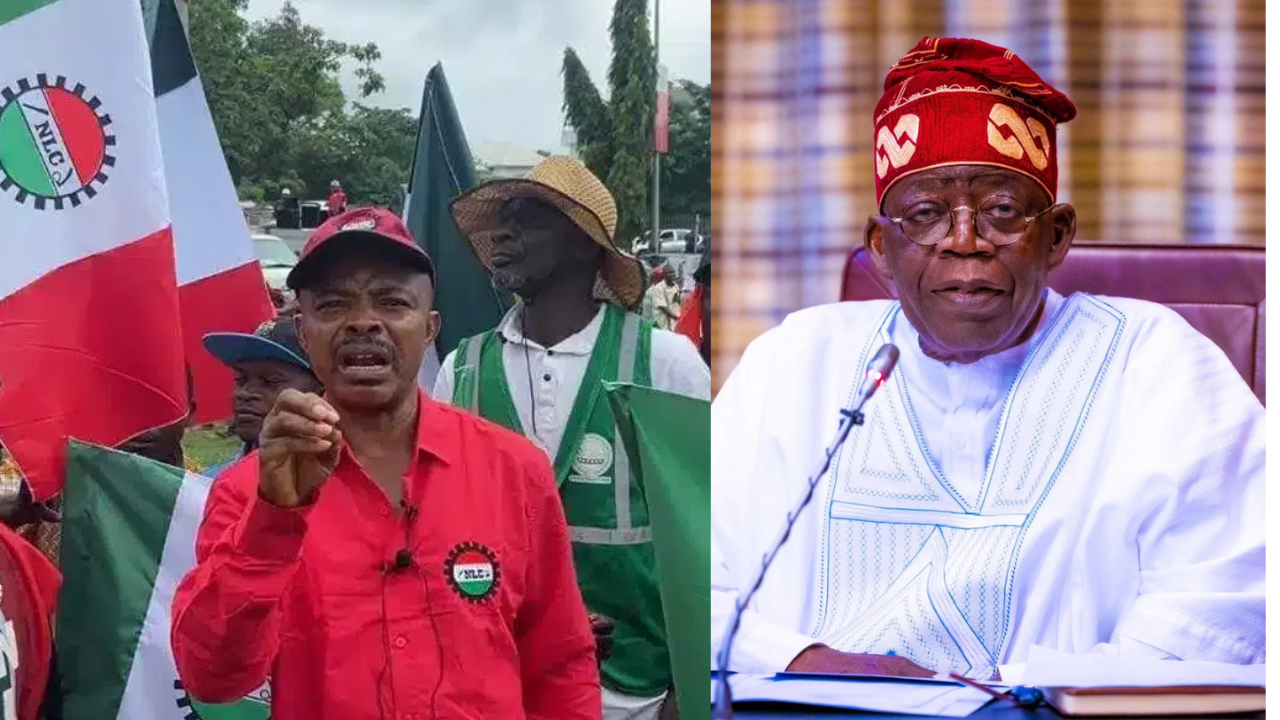POLITICS

TINUBU’S TWO YEARS: NLC SAYS NIGERIANS FACE ONLY HARDSHIP, NO PROGRESS
The Nigeria Labour Congress (NLC) has delivered a scathing assessment of President Bola Tinubu’s administration as it marks two years in office, stating that the government has brought Nigerians nothing but suffering and hardship.
In a statement reflecting on the administration’s performance since its inauguration on May 29, 2023, NLC President Joe Ajaero said there is little to celebrate. He accused the government of imposing policies that have deepened poverty and worsened living conditions for workers and the wider population.
“When President Tinubu took office, he promised a new era through bold economic reforms. But two years on, the only thing bold is the scale of the suffering Nigerians now endure,” Ajaero said.
Fallout from Subsidy Removal and Economic Policies
Ajaero criticized the removal of the petrol subsidy, which saw fuel prices jump from ₦187 to over ₦600 per litre overnight, triggering inflation and placing immense strain on household incomes.
“The government argued that the removal would unlock funds for development. Instead, we’ve witnessed record inflation, widespread hunger, job losses, and the collapse of small businesses. The naira’s value has plummeted, and local industries are buckling under imported inflation,” he said.
He added that these policies mirror failed neoliberal measures of the past, often imposed under the guidance of international financial institutions like the IMF.
“We’ve seen this approach before—subsidy cuts, currency devaluations, and austerity—none of which improved lives. Tinubu’s version has simply exacerbated inequality and deepened the suffering.”
Impact on Workers and Labour Unions
Ajaero also highlighted what he described as worsening conditions for Nigerian workers, including eroded wages, unpaid arrears, and escalating attacks on labour rights.
“Over 150 million Nigerians now live in multi-dimensional poverty. Pensioners and SMEs are under severe pressure, and union leaders face intimidation for simply demanding better conditions. The government's promises remain unfulfilled,” he stated.
Although the government introduced compressed natural gas (CNG) buses to ease transportation burdens, the NLC said this measure is inadequate, citing major infrastructural gaps.
Absence of Dialogue, Rise in Oppression
The NLC further criticized the breakdown of dialogue between the government and labour unions, alleging that peaceful demands for fair wages are often met with repression.
“While the government urges citizens to endure hardship, public officials enjoy luxury. There is a clear disconnect between leadership and the suffering masses,” Ajaero said.
He pointed to the continued benefits enjoyed by the elite—currency speculators, oil interests, and international creditors—as evidence that the economic policies are rigged against ordinary Nigerians.
Security Crisis Overshadowing Economic Reform
Beyond economic issues, the NLC expressed alarm over Nigeria’s deteriorating security situation. According to Ajaero, the country faces widespread violence from insurgent groups, kidnappers, and bandits.
“In such a context, discussing economic reforms feels surreal. Who invests in a country where daily life is marked by fear, loss, and instability?” he asked.
He argued that ensuring the safety of lives and property must take precedence over economic debates, stating that the government’s failure to provide security undermines any reform agenda.
“True reforms must improve lives. Policies that increase pain and suffering are not reforms—they’re systematic assaults on the poor, designed to benefit the privileged few.”
Global Labour Rights in Decline – Nigeria Listed Among Worst
The NLC’s concerns echo global trends highlighted in the newly released 2025 ITUC Global Rights Index, which reveals a sharp decline in workers’ rights worldwide. The report, published by the International Trade Union Confederation (ITUC), ranks Nigeria among the 10 worst countries for workers in 2025.
Only seven countries globally now receive the top rating of ‘1’ for their respect for workers' rights, down from 18 in 2014. Meanwhile, 51 countries have earned the lowest rankings of 5 and 5+, including Nigeria.
Key findings include:
- 87% of countries violated the right to strike.
- 80% breached collective bargaining rights.
- Workers were arrested in 71 countries, and violence against them occurred in 40.
- 75% of countries denied workers the right to form or join unions.
Luc Triangle, ITUC General-Secretary, blamed the global erosion of labour rights on decades of deregulation and neoliberal policies.
“The collapse of the post-WWII democratic and labour rights framework has disenfranchised millions and fuelled extremism. But this is not irreversible—it’s a deliberate choice that can be undone,” Triangle stated.
The ITUC called on democratic governments and international institutions to reverse this trend by empowering independent unions and protecting workers' rights across all sectors.
Outlook
As the Tinubu administration enters its third year, growing domestic and international scrutiny over its economic and labour policies underscores mounting pressure for a shift in direction. The NLC’s message is clear: unless reforms are rooted in social justice and inclusive growth, the promises of a better Nigeria will remain unfulfilled.
"This represents a significant development in our ongoing coverage of current events."— Editorial Board









